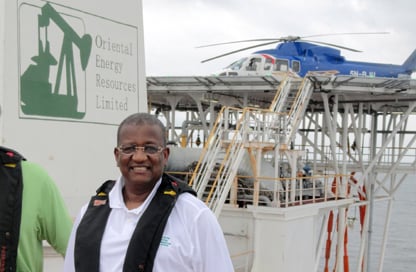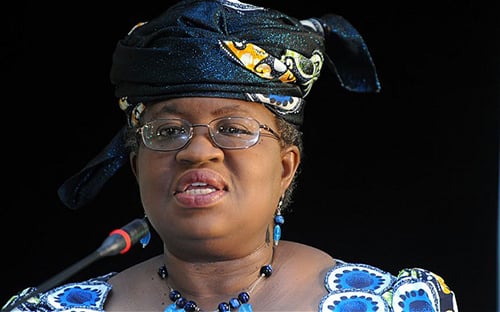Muhammadu Indimi, executive chairman of Oriental Energy Resources Limited, has reacted to a series of allegations in a recent press statement issued by Afren, the UK-based oil explorer.
On Friday, Afren dismissed its chief executive, Osman Shahenshah, and chief operating officer, Shahid Ullah, for “gross misconduct”.
An independent review by law firm Willkie Farr & Gallagher LP alleged they had received more than $17 million in unauthorised payments from Oriental, its Nigerian joint-venture partner.
Oriental is the 60% equity owner operator of the Ebok and Okwok assets, Offshore Nigeria.
Advertisement
Indimi (pictured) said Afren’s summary of WFG’s findings was “a collection of suppositions, unsupported innuendoes and series of false and defamatory statements”, saying Oriental “does not understand how so much time was spent producing a report with so little that can be relied upon.”
The Nigerian company said there was an agreement to pay 15% of the cash flows from its joint venture with Afren into a special purpose vehicle called Ntiti BVI.
It was intended to reward and retain key employees connected to the project, Indimi said.
Advertisement
But in the review, WFG had alleged that Ntiti is owned and controlled by Shahenshah and Ullah, and that they had used the vehicle to pay special bonuses to themselves and other Afren employees.
Below is a full text of the Indimi’s press statement.
First Agreement with Oriental Energy – July 2012
Oriental categorically denies that the forward sale of crude oil transaction of $100 million in July 2012 was a “loan” as mischaracterized by the Afren press release. Oriental and Afren entered into the Oriental Ebok Forward Sale of Crude Oil Agreement (“Forward Sale Agreement”) in July 2012. Forward sales of crude oil among partners is a common practice in the international upstream petroleum industry. In fact, the Forward Sale Agreement was an agreement for the prepayment of oil. Oriental agreed to sell approximately one million barrels of its future oil production to Afren thereby permitting Afren to book those reserves in 2012. The reason the $100 million payment to Oriental was included in Afren’s balance sheet for 31 December 2012 under the line “Prepayment and Advances to Partners” is because it was, indeed, a prepayment for Oriental’s future oil production.
Advertisement
In reference to the $100 million forward sale, which Afren erroneously referred to as a loan, Afren properly deducted $100 million in oil equivalent barrels from Oriental’s 2014 Profit Oil. This was provisioned under an amendment to the original Forward Sale Agreement by the Amended and Restated Ebok Joint Operating Agreement of August 2013 (“JOA”). This was agreed so as to conform with the terms of the original Forward Sale Agreement in allowing Afren to recover $100 million in Profit Oil from Oriental’s post-Payout share of Profit Oil barrels.
Second Agreement with Oriental Energy – August 2013
On the 23rd of August 2013 Afren and Oriental signed the JOA which had been under negotiation since the summer of 2012. At no time was there ever any conjoining of the JOA with the $300 million payment as a quid pro quo to Oriental, as misrepresented by Afren. The two payments of $180 million and $120 million are explained below.
The Afren press release includes among its most outrageous misrepresentations the statement that “the agreement was conditional on Pioneer status being confirmed for Ebok which occurred in October 2013”. The Pioneer status was officially confirmed by letter dated May 15, 2013 and by an official certificate dated 5 September 2013, both dates well in advance of the October 2013 date misstated by Afren: the official written confirmation date of May 15 occurred months before the Ebok JOA was signed by both parties on August 23, 2013 and therefore it could not have been a condition for signing the amended Ebok JOA.
Advertisement
Furthermore, there is no such thing as an “Amendment Agreement” erroneously referred to twice in the first paragraph of Afren’s press release under this heading, and a total of eight additional times in the subsequent paragraphs. An “Amendment Agreement” would have been an agreement to agree and there was and is no such document. Such careless reference to fictitious dates and nonexistent documents as the basis for its infamous charges in this section only serves to confirm the absence of truth and the complete irresponsibility of Afren and of the report summary attributed to WFG in making these and the other consistently false and unsupported defamatory allegations contained in its October 13 release.
The amendment of the Ebok JOA that has occurred from time to time since the inception of the Oriental-Afren Joint Venture is absolutely a matter in the ordinary course of business. By the summer of 2012, due to the number of pre-existing deeds of amendment to the Ebok JOA, the parties deemed it appropriate to undertake the amendment and complete restatement of the JOA, a document consisting of approximately 75 pages with an additional 30 pages of accounting procedures. This complex labor-intensive process began in 2012 and continued well into 2013, eventually overlapping the Payout Date for the Ebok Phase One Development that occurred in May 2013 (the Payout Date for Phase One Development is the date when Afren recovers its 50% of capital payments that Afren made on Oriental’s behalf [approximately US $1 billion], which is also the date upon which Oriental begins to receive its 50% share of Ebok net Profit Oil).
Advertisement
Under the JOA Oriental should have received its share of net Profit Oil from May 2013 but Oriental did not receive any such payments from Afren until August 2013 when it received the $180 million, half of which was payment in arrears of Oriental’s Profit Oil and the other half of which was the prepayment of approximately four months of Oriental’s Profit Oil through year end 2013. There is no way in which this payment to Oriental can be characterized as a loan: to the extent that Oriental received prepayment for its oil, Oriental sold those barrels to Afren. The fact that the $180 million payment provision was incorporated into the JOA amendment process seems to Oriental to be completely in the normal course of business. Its incorporation into the Ebok JOA amendment process then underway is purely coincidental.
Furthermore, the $120 million payment to Oriental in November 2013 was proposed by Afren to settle a longstanding dispute over the ownership of certain tax allowances resulting from capital expenditures on the project before and after production began in April 2011. The dispute was finally resolved in August 2013 as part of the JOA amendment process, although the $120 million was not paid until late November 2013. There is no logical reason to support the aggregation of the $120 million and the $180 million into a single $300 million amount due to the completely independent nature of the two commercial settlements and the fact the payments were made four months apart. Although the prepayment of Oriental’s Profit Oil and the tax allowance dispute resolution both became amendments to the JOA there were a large number of additional amendments concurrently made, some benefitting Afren and some benefitting Oriental as is typical of the give and take normally seen in complex contract negotiations. The records of these negotiations are in the files of both parties and are beyond dispute.
Advertisement
Alleged Unauthorized Payments
In October 2013 Oriental entered into an agreement with NTITI, the Oil Field Development Optimization Services Agreement (“Optimization Agreement”), represented by senior executives of the Ebok Joint Operating Team (“JOT”). Under the Optimization Agreement Oriental agreed to pay up to 15% of its annual net Ebok Profit Oil proceeds to NTITI for the purpose of providing incentive compensation and retention of key employees who had proven themselves to be essential members of the Ebok JOT, a group reporting to the Ebok Operating Committee and comprised of employees seconded by both Oriental and Afren, as provided by the JOA. The Optimization Agreement provided financial compensation to select key employees of both companies upon attainment of annual performance goals set by the Ebok Operating Committee. Oriental had every reason to believe that the Optimization Agreement had been disclosed, at least in conceptual form, to members of the Afren Board. Oriental utterly refutes Afren’s use of the term “ostensibly” in describing the intent of the Optimization Agreement. It was clear to everyone privy to the Optimization Agreement that its intent and anticipated effect in rewarding and retaining key employees of the Project was in fact the sole purpose of that Agreement and would be wholly to the benefit of the Ebok Joint Venture participants, Afren and Oriental equally.
Advertisement
Throughout the almost three months of the WFG investigation never once did WFG attempt to make contact with Oriental to question or verify the purpose of the Optimization Agreement, the Crude Oil Forward Sale Agreement, the JOA, or any other matter having a bearing on the investigation within Oriental’s knowledge. Oriental, therefore, condemns all conclusions drawn by WFG as to the intent and true purpose of those agreements as biased supposition and further condemns Afren’s current executive leadership for its failure to respond to the numerous overtures that Oriental made to resolve these issues.
Oriental’s Executive Chairman, Dr. Muhammadu Indimi, OFR, said that “The Afren Board’s full knowledge of Oriental’s innocent intent and willingness to resolve any conflict renders Afren’s conduct from the beginning of the crisis until now incomprehensible, particularly the manner in which Afren has treated its valuable employees. Oriental has observed the extraordinary performance and profound dedication of the Afren employees seconded to the Ebok Joint Operating Team over the past more than five years. We have seen the personal sacrifices made by many of the members of the Ebok JOT and we have also seen their extraordinary successes where three of the Oriental JV partners who preceded Afren have largely failed. These outstanding men and women have delivered enormous value to the Afren shareholders and it is more than tragic to witness the destruction of the lives and livelihoods of these dedicated Afren employees.”
In conclusion, Oriental’s rebuttal of Afren’s Press Release and of the WFG report summary demonstrates the flawed nature and careless manner in which the investigation has been reported, and calls in question all of the conclusions it contains. Oriental does not understand how so much time was spent producing a report with so little that can be relied upon. The WFG report appears to Oriental to be irresponsible and indefensible as presented and we deeply regret Afren’s decision to publish this material.
Oriental finds it incomprehensible that Afren would release such an erroneous document without studying its records or consulting with its Partner. It is our sincere hope that Afren will recover from its current leadership crisis and that the Partnership can return to its former cordial relations and exemplary performance in Nigeria’s upstream oil industry.
Add a comment






